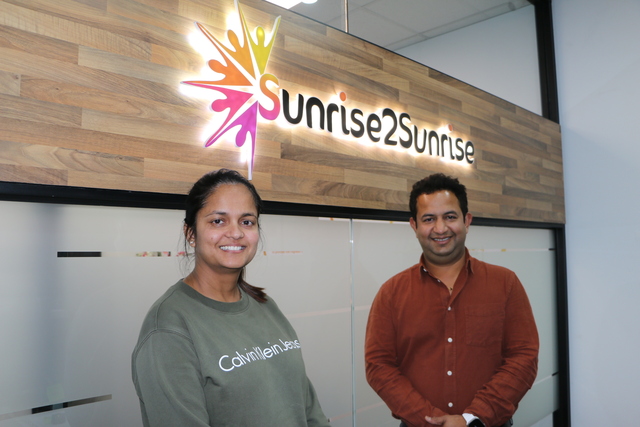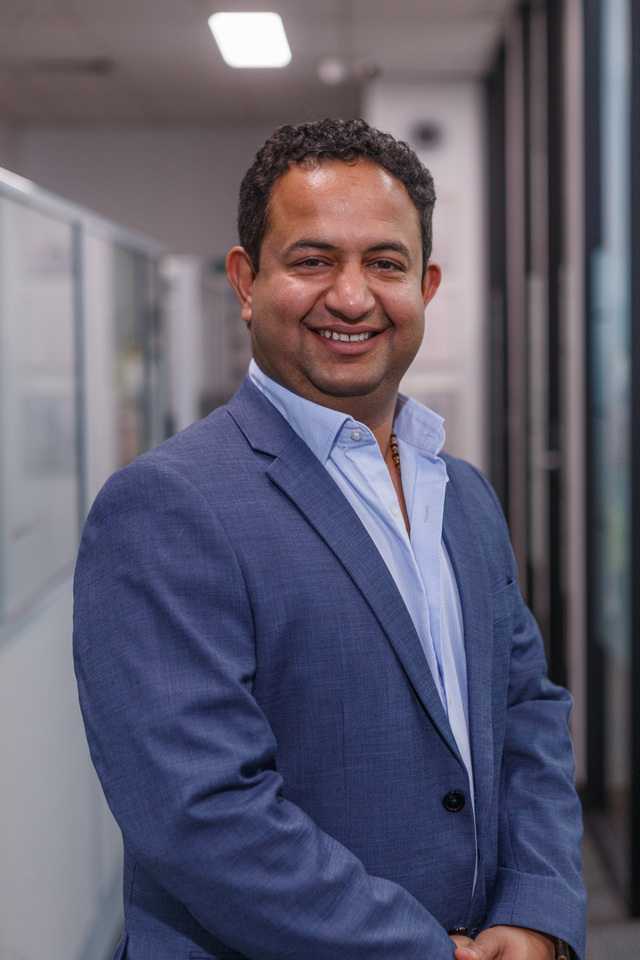
PRECEDE: Having always worked in not-for-profits, Ravi Bhatt knew he would spend his life supporting those in need. Only he didn’t expect it to be dedicated to the disability sector, let alone be in Australia. More than a decade after his first casual job as a support worker, he now speaks to Gazette journalist Corey Everitt as the managing director and co-founder of Pakenham’s Sunrise2Sunrise – a pioneering star in disability support.
BREAKOUT QUOTE: “I am doing the same thing I have been doing from day one, which is having to provide the best possible support for the moment of whatever the level of work I’m doing.”
Sunrise2Sunrise (S2S) started in Treloar Lane about six years ago. With just a handful of workers to begin with, the disability support service was founded by Ravi Bhatt and Krishna Sevak.
In those short years, S2S has expanded to over 700 staff, three offices and 12 departments.
Ravi stands as the Managing Director, though his day to day work wouldn’t appear akin to the role of someone in an executive-like role.
It’s hard to catch him in his office in Pakenham as he is mostly out on the road making decisions when he is needed between cases he handles.
He can’t shake the need to still be out there with his frontline support workers, every Tuesday he has dinner with a participant.
“The reason I do that is not because we don’t have the resources. I got enough people in my organisation to be able to provide their support,“ Ravi said.
“Of course I enjoy the connection and meeting people, but on top of that dinner with participants it not only sends the organisation a message, but it’s having that modality of simply sitting and eating with somebody.“
For Ravi, being in the ‘care industry’ means you really do have to ‘care’.
“I never really looked at it as whether or not we have a successful business, this many people work for me and so on,” he said.
“I am doing the same thing I have been doing from day one, which is having to provide the best possible support for the moment of whatever the level of work I’m doing.”
He started his first role as a casual disability support worker in 2008. He moved to Australia from India a short period before to study and help his sister.
He wasn’t initially familiar with the role as it’s not a form of employment in his home country.
However, he already had experience working for NGOs around a range of issues in India.
Combined with his studies in community welfare, he got the job. At first it was driven just by the need for income.
It was a call to his father, when he was confronted by the values he had forgotten from home.
“He goes what do you do? Tell me about the job. I say there are two people living in a house, I help them to eat, sleep, shower, watch TV, give them medications, make sure they are comfortable enough to sleep and just help them have a better day,” Ravi recalled.
“He said that’s no job! I told him it is, it’s a job here.
“He got angry, he told me it’s not, you are not supposed to get paid to help people, that’s the nature of the human being. I have given you the value to live to help people, you cannot get paid.”
Faced with this realisation he reconstituted his work and made a proposal to compromise between the values he was raised with and the reality of his new home.
“That was the value I grew up with, but I had a gap of coming here, struggling, getting my visa, all of these things and it was forgotten,” he said.
“That day I still remember like yesterday, I decided I will work in this industry for the rest of my life.
“Then I had a check with dad, I said this is how the system here works. But it can be good if I get paid work then I can do it for the rest of my life.”
His father accepted the proposal and he began his support work with renewed purpose. A few years later he was recruited to a pilot program of the then recently instituted National Disability Insurance Scheme.
His role was to travel and educate other workers in the field as the NDIS was being rolled out.
“I’m going wow, this is going to change things, people with disability are going to be supported and I wanted to be a part of that,” Ravi said.
He was doing this while still in his paid role, many of the people he would work with would ask why he wasn’t starting his own service, which he would dismiss at first. Until the flaws of some of the services began to surface for him.
“That frustration was always there on the back of my mind when I worked in the bigger organisations, the biggest challenge was the layer of management,” Ravi said.
“The problems became so big for the participants before it gets to the person making the decision.
“Simple things like changing the blind because the sun is coming into the room and waking them up, could take three weeks.
“In our organisation, no more than 24 hours.”
His leadership combined with his years of experience on the ground inspired him to go his own way, a path free of the backlog with direct service.
In 2018, Ravi and Krishna would initiate Sunrise2Sunrise, its slogan would become ‘care when you need it, care how you want it’.
“I said to my staff, when I pick up the call or meet the participant I know that they are going through it because I was in their shoes for a very long time,” he said.
“Normally when people open a business they come up with a business plan of 200 pages of what they are going to do, how they are going to do it, we didn’t do any of that.
“It was how can we help people to get the best support not within the box.”
S2S would quickly gain attention from the wider sector and government bodies as they demonstrated exceptional determination and skill in their work.
Ravi worked to educate staff in Dandenong Hospital’s Secure Extended Care Unit, where he eventually brought together a multidisciplinary team that worked on securing patients an NDIS plan.
Many patients were in long-term care, but the work got them on a footing to independence and toward the support they need to live in the community. Over half secured a plan from these efforts.
“Our main goal was, if you have the right funding, you will be able to go out and find the solutions,” Ravi said.
The pandemic proved their worth as they worked tirelessly securing safe housing for people who had to quarantine, as well as ensuring access to PPE and vaccinations.
S2S would take on all tasks, even the difficult ones like working with at-risk youth.
“A lot of providers go, I don’t want to touch it, I don’t want to do it because of the complexity because we are talking about involvements from court, senior practitioners, etc.”
“So we have a specific team of people we hired to perform this work.
“Overtime, what happened is that we were not only able to change young people’s and the family’s life, but also move them to child protection work.”
As a result the State Government invited S2S to be a service that can facilitate child protection work for out-of-home care.
The work spans a range of departments today, but the core goal of ensuring the disadvantaged have the necessities to pursue their wants remains.
Having your own home is crucial to independence and a large part of S2S success has been focused on ensuring participants have a place of their own.
The work at Dandenong Hospital continues as the services works closely to ensure housing, where in many cases patients are discharged at a certain age, usually to aged care.
In a recent case, Ravi happened to meet Sarah at the hospital who was in and out of care and homeless. They worked to secure a house for her in Keysborough where she has been living for the last 18 months.
S2S will even work to build a house, not just find it. For one participant they collaborated with providers, investors and builders to construct a home, where from there they provided the service to integrate them into the community.
Funding for support is the most important for someone with a disability and securing it with an NDIS plan can be a difficult experience. That’s why S2S decided to have a dedicated person that provides help for free.
“What we see is navigating NDIS plans is very tricky, time-consuming,” Ravi said.
“We work case to case and help them to provide full support on what they need to do to get their NDIS plan without charging anything.
“Our coordinator goes and sits down with families, spending hours telling them how to claim, how to get the right support.”
Much like Outlook, S2S has become a leading example for supporting those in need in the Pakenham community and beyond. All within a Federal scheme just over a decade old.
There is still work to be done, but Ravi believes the level that has been achieved in these short years proves the NDIS is on the right track.
“It’s a great funding system, it’s a great scheme that has changed a lot of people’s lives that I have witnessed myself,” he said.
“The direction is right, the speed just needs to be faster.”
Recently, S2S became a cornerstone partner of the Cardinia Foundation. Ravi will be at the Migrants Life Exhibition at Federation Square on 29 June, he will appear on a panel with former cricket player Brett Lee to talk of his story and contribution to the community.








